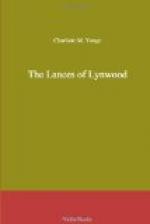CHAPTER XIII
There was a village at some distance from the Chateau Norbelle, the inhabitants of which were required to furnish it with provisions. The Castellane, by paying just prices, and preventing his men from treating the peasants in the cruel and exacting manner to which they were accustomed, had gained their good-will. Prompt intelligence of the proceedings of the French army was always brought to him, and he was thus informed that a large treasure was on its way from Bayonne to Carcasonne, being the subsidy promised by Enrique, King of Castile, to his allies, Bertrand du Guesclin and Oliver de Clisson.
It became the duty of the English to intercept these supplies, and Eustace knew that he should incur censure should he allow the occasion to pass. But how divide his garrison? Which of the men-at-arms could be relied on? After consultation with d’Aubricour, it was determined that he himself should remain with John Ingram and a sufficient number of English to keep the traitors in check, while Gaston went forth in command of the party, who were certain to fight with a good will where spoil was the object. They would be absent at least two nights, since the pass of the Pyrenees, where they intended to lie in ambush, was at a considerable distance, nor was the time of the arrival of the convoy absolutely certain.
The expedition proved completely successful, and on the morning of the third day the rising sun beheld Gaston d’Aubricour riding triumphantly at the head of his little band, in the midst of which was a long line of heavily-laden baggage mules. The towers of Chateau Norbelle appeared in his view, when suddenly with a cry of amazement he perceived that the pennon of St. George and the banner of Lynwood were both absent from the Keep. He could scarcely believe his eyes, but forcing his horse onward with furious impetuosity to obtain a nearer view, he discovered that it was indeed true.
“The miscreants!” he shouted. “Oh, my Knight, my Knight!” and turning to the men who followed him, he exclaimed, “There is yet hope! Will you see our trust betrayed, our noble Knight foully murdered and delivered to his enemies, or will ye strike a bold stroke in his defence? He who is not dead to honour, follow me!”
There was a postern, of which Eustace had given Gaston the key, on his departure, and thither the faithful Squire hastened, without looking back to see whether he was followed by many or few—in fact, rather ready to die with Sir Eustace than hoping to rescue him. The ten Englishmen and some eight Frenchmen, infected by the desperation of his manner, followed him closely as he rushed up the slope, dashed through the moat, and in another moment, opening the door, burst into the court. There stood a party of the garrison, upon whom he rushed with a shout of “Death, death to the traitor!” Gaston’s arm did the work of three, as he hewed down the villains, who, surprised and discomfited, made feeble resistance. Who they were, or how many, he saw not, he cared not, but struck right and left, till the piteous cries for mercy, in familiar tones, made some impression, and he paused, as did his companions, while, in a tone of rage and anguish, he demanded, “Where is Sir Eustace?”




